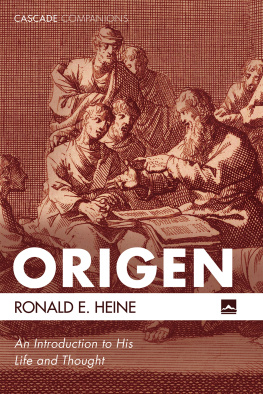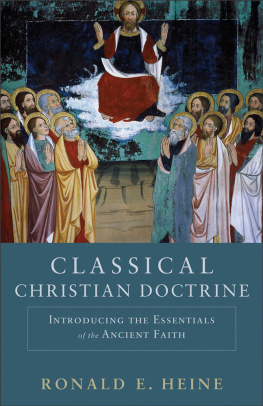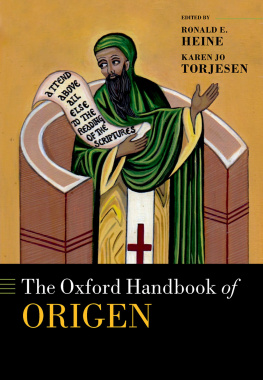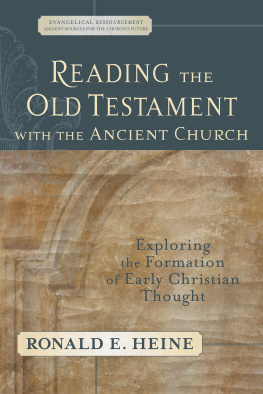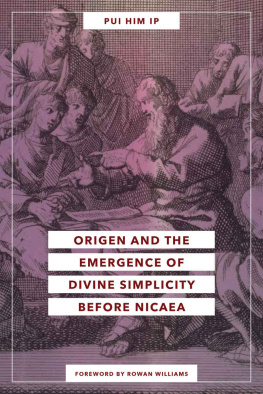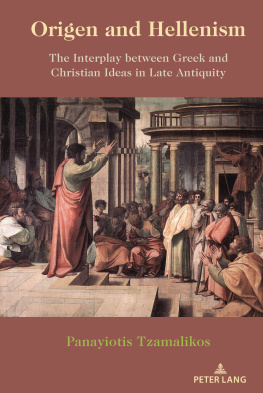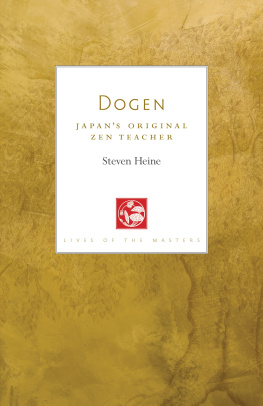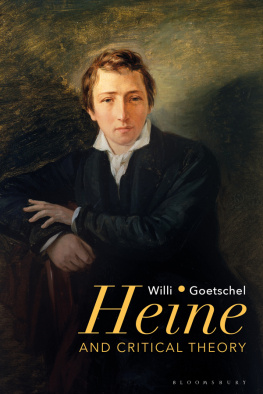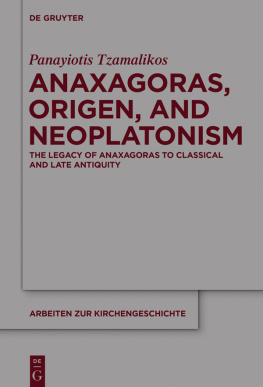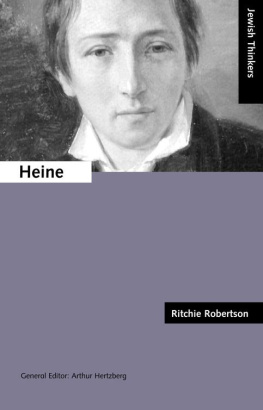Ronald E. Heine - Origen : an Introduction to His Life and Thought.
Here you can read online Ronald E. Heine - Origen : an Introduction to His Life and Thought. full text of the book (entire story) in english for free. Download pdf and epub, get meaning, cover and reviews about this ebook. year: 2019, publisher: Wipf and Stock Publishers, genre: Religion. Description of the work, (preface) as well as reviews are available. Best literature library LitArk.com created for fans of good reading and offers a wide selection of genres:
Romance novel
Science fiction
Adventure
Detective
Science
History
Home and family
Prose
Art
Politics
Computer
Non-fiction
Religion
Business
Children
Humor
Choose a favorite category and find really read worthwhile books. Enjoy immersion in the world of imagination, feel the emotions of the characters or learn something new for yourself, make an fascinating discovery.
- Book:Origen : an Introduction to His Life and Thought.
- Author:
- Publisher:Wipf and Stock Publishers
- Genre:
- Year:2019
- Rating:3 / 5
- Favourites:Add to favourites
- Your mark:
- 60
- 1
- 2
- 3
- 4
- 5
Origen : an Introduction to His Life and Thought.: summary, description and annotation
We offer to read an annotation, description, summary or preface (depends on what the author of the book "Origen : an Introduction to His Life and Thought." wrote himself). If you haven't found the necessary information about the book — write in the comments, we will try to find it.
Origen : an Introduction to His Life and Thought. — read online for free the complete book (whole text) full work
Below is the text of the book, divided by pages. System saving the place of the last page read, allows you to conveniently read the book "Origen : an Introduction to His Life and Thought." online for free, without having to search again every time where you left off. Put a bookmark, and you can go to the page where you finished reading at any time.
Font size:
Interval:
Bookmark:
An Introduction to His Life and Thought
Ronald E. Heine

O ne can only wish or dream that her or his own intellectual work on understanding Scripture or setting forth its theological meaning will endure so long or reach so far as that of Origen of Alexandria. While he was dead by the middle of the third century, Origens work has continued to stir deep admiration and animosity down to the present time, although much of the animosity has abated since the work of some significant scholars in the twentieth century. His influence has crossed all boundaries in the church from the ancient Greek and Latin speaking East-West boundaries to the modern ones of Orthodox, Catholic, and Protestant. Much of his extensive work was lost or destroyed soon after his lifetime, but a large corpus has continued to exist, either in its original Greek or in later Latin translations. In more recent times additional texts have been recovered through fortuitous discoveries, first that of the Tura papyri in Egypt in the mid-twentieth century, which yielded two previously unknown texts: the Dialogue with Heraclides and the Treatise on the Passover , along with portions of texts already possessed, and more recently, in 2012 , the discovery of twenty-nine Greek homilies on the Psalms in a twelfth - century codex in the Bayerischen Staatsbibliothek in Munich. New editions and translations of Origens works continue to be produced in numerous countries and languages. They can be found in series and in individual translations in German, French, Italian, Spanish, and English, and probably in others of which I am unaware.
In the last decade of the twentieth century I was director of a small research institute called the Institute for the Study of Christian Origins sponsored by the Disciples of Christ in Tbingen, Germany. I recently revisited Tbingen to participate in a symposium. In a conversation with one of the participants at the symposium I was asked who was teaching theological subjects at the University when I was working in Tbingen. When I began to list a few of the theologians who were at the University at that timeMartin Hengel, Jrgen Moltmann, Hans Kngmy conversation partner interrupted me and said, O, you were here when the giants were here! I had not thought of them in that particular way when I was living and working in Tbingen, but that is a good descriptive term for the collection of notable theological scholars who were clustered at the Eberhard Karls University in Tbingen at that time. And that is a good descriptive term for Origen.
Origen was a giant in the early church. When one thinks beyond the first century and the apostles, there was no one comparable to him until one gets to Augustine in the late fourth century. Origen moved like a colossus over the intellectual life of the early church, whether one thinks of biblical interpretation, theological insight, doctrinal development, or influence on subsequent leaders of the church. He had a lasting influence on how the church read Scripture, especially the Old Testament, and on how it thought about and formulated its doctrines. His pervasive influence spread through his immediate contact with students and the publication of his numerous writings.
Origen was greatly admired and intensely disliked during his lifetime and afterwards. Both of those reactions were often elicited by the fact that his thought was frequently outside the box, so to speak. At a time when the majority in the church, including its bishops and presbyters, believed that Scripture must be read and understood in the simple, literal meaning of the words, Origen deftly practiced a non-literal way of understanding Scriptures words that rankled the feelings of many of his readers or listeners. This can often be detected by remarks he makes in his homilies and commentaries. His teachings about the basic Christian doctrines of the creation of the universe, the incarnation of Christ, and the consummation of history also diverged, significantly in many cases, from views held by multitudes in his time. Aspects of these same views, nevertheless, would later become incorporated into the general faith of the church in the West as well as the East. Many of the most important leaders of the western church in the fourth century were strongly influenced by Origens way of interpreting Scripture and by his theological insights, including Augustine of Hippo, Ambrose of Milan, and Jerome of Bethlehem.
Origen did not develop his thought in an academic context nor did he envision his many treatises serving such an audience. He developed his thought in the context of the church and he produced his treatises to serve the churchto protect it from straying from what he considered to be the truth of the message of Christ and to enable it to understand this message in its diverse Scriptural expressions. In one of his earlier works, written while he was still living in Alexandria, Origen notes that he has undertaken to write books interpreting the Scriptures because numerous such books were being produced by heterodox Christians that threatened to confuse or mislead those faithful to the common understanding of the church.
This book begins by sketching the more important influences on the formation of Origens thought, including the circumstances of his life, so far as that is knowable. The sources for depicting Origens life are scarce. While a large number of his writings have been preserved, he says very little about himself in them. He had copied many of Origens works with his own hand. He was later imprisoned and while in prison he wrote the five books of his Apology with the help of Eusebius. After Pamphilus martyrdom, Eusebius added a sixth book. These books too, with the exception of the first, have perished.
There are only a few sources from which we derive our biographical information about Origen, all from the fourth century. Jerome and Rufinus, Latin authors of the Western church, both translated numerous works of Origen from Greek into Latin and in the process provided some information about his life. The first book of the Apology for Origen by Pamphilus is another source of information. The Apology , however, is primarily a defense of Origens thought and says very little about his life in general. This, too, has been preserved only in a Latin translation by Rufinus in the fourth century. The two main sources from antiquity that provide biographical information about Origens life are both from the Eastern Greek-speaking church: works of Eusebius of Caesarea and Epiphanius of Salamis. The sixth book of the Church History of Eusebius, bishop of Caesarea in Palestine, is the most important source. Origen was a kind of hero of the faith in Eusebius eyes. The other source is section sixty-four of the Panarion ( Medicine Chest ) of Epiphanius, bishop of Salamis in Cyprus, for whom Origen was a heretic.
Eusebius, as bishop in Caesarea, had ready access to important resources about Origens life. Origen had spent the last portion of his life in Caesarea, and Pamphilus, who had studied Origens works thoroughly, was presbyter there before Eusebius. Furthermore, it is generally recognized that a unique feature of Eusebius historical works is his wide use and careful quotation of written sources.
This book is not an attempt to say everything that can be said about Origen, especially in the chapter on his thought. It is an introduction and as such hopes, beyond simply making him known to those who are unfamiliar with his life and thought, to elicit an interest in reading some of Origens texts and wrestling with their complexities. I have also tried to allow Origen to speak for himself as much as possible, and in this way to give the reader access to Origens own words (in English translation, of course). As I indicated at the beginning of this introduction, Origen was one of the most important and influential thinkers in the early church. Throughout his life he worked diligently at the interpretation of Scripture in his commentaries that covered most of the books of the Bible and in the application of Scripture to life in these commentaries as well as in his homilies. The extent of his influence on the churchs faith makes an acquaintance with his life and thought essential to anyone who wants to understand the roots of Christian faith.
Font size:
Interval:
Bookmark:
Similar books «Origen : an Introduction to His Life and Thought.»
Look at similar books to Origen : an Introduction to His Life and Thought.. We have selected literature similar in name and meaning in the hope of providing readers with more options to find new, interesting, not yet read works.
Discussion, reviews of the book Origen : an Introduction to His Life and Thought. and just readers' own opinions. Leave your comments, write what you think about the work, its meaning or the main characters. Specify what exactly you liked and what you didn't like, and why you think so.

